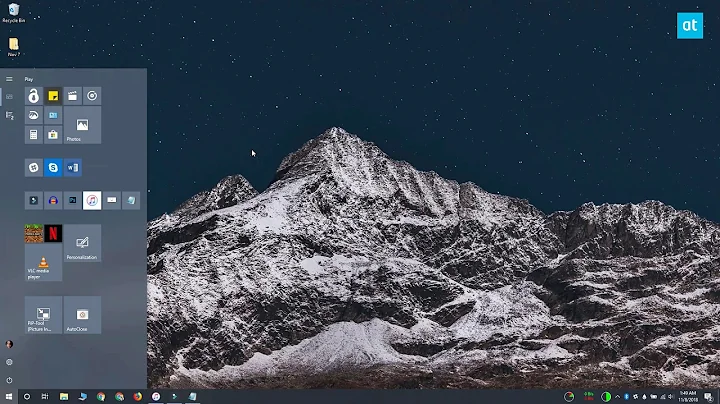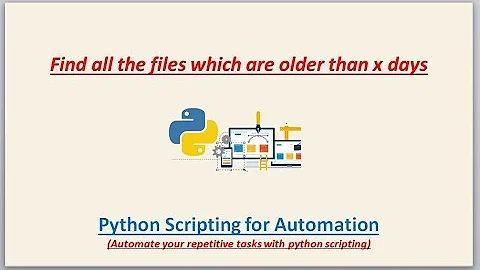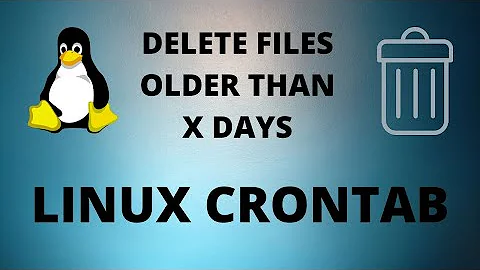Delete files older than X days +
Solution 1
Be careful with special file names (spaces, quotes) when piping to rm.
There is a safe alternative - the -delete option:
find /path/to/directory/ -mindepth 1 -mtime +5 -delete
That's it, no separate rm call and you don't need to worry about file names.
Replace -delete with -depth -print to test this command before you run it (-delete implies -depth).
Explanation:
-
-mindepth 1: without this,.(the directory itself) might also match and therefore get deleted. -
-mtime +5: process files whose data was last modified 5*24 hours ago.
Solution 2
Note that this command will not work when it finds too many files. It will yield an error like:
bash: /usr/bin/find: Argument list too long
Meaning the exec system call's limit on the length of a command line was exceeded. Instead of executing rm that way it's a lot more efficient to use xargs. Here's an example that works:
find /root/Maildir/ -mindepth 1 -type f -mtime +14 | xargs rm
This will remove all files (type f) modified longer than 14 days ago under /root/Maildir/ recursively from there and deeper (mindepth 1). See the find manual for more options.
Solution 3
It's the same. You just have to provide the parent directory rather than the prefix of files. In your example, it would be:
find /path/to -type f -mtime +5 -exec rm {} \;
This will delete all the files older than 5 days which are under /path/to and its sub-directories.
To delete empty sub-directories, refer to @Costas comment above.
Related videos on Youtube
John Edgar
Updated on September 18, 2022Comments
-
John Edgar almost 2 years
I have found the command to delete files older than 5 days in a folder
find /path/to/files* -mtime +5 -exec rm {} \;But how do I also do this for subdirectories in that folder?
-
 rahul about 9 yearsDo you mean files inside the sub directories? or the sub directories themselves?
rahul about 9 yearsDo you mean files inside the sub directories? or the sub directories themselves? -
 Costas about 9 years
Costas about 9 yearsfind /path/to -type d -empty -delete -
John Edgar about 9 yearsDelete files in subdirectories that are also 5+ days old
-
Jpark822 about 9 yearsPossibly fun when I have files with spaces. E.g a file called "test one" and rm gets fed
rm test one. (Which will delete a file called "test" and a file called "one", but not a file called "test one"). Hint: -delete or -print0 -
Walf about 8 yearsAs a side note, always quote the argument provided by
findto avoid issues with special characters, as mentioned in the answer's first line. E.g.:find /path/to/files/ -exec somecommand '{}' \; -
 Kusalananda about 4 years@Walf The only reason one would want to quote
Kusalananda about 4 years@Walf The only reason one would want to quote{}is if one's shell treats that 2-character string specially. I believe(t)cshdoes this, but no other shell that I know of. You don't have to quote{}in e.g.bash, no matter what filenames you come across. The POSIX standard guarantees that each found pathname will be given to the utility as a separate argument. -
Walf about 4 years@Kusalananda or if you're writing a command that may end up getting executed in another shell like
fish. Don't make assumptions, better safe than sorry, etc. Makes it obvious that it's an argument tofind, like when you have to quote glob patterns inside-name(and related) arguments. -
Seth Projnabrata over 3 yearsThe easiest way is the below . You can first check the file names count with the below for the last 2 months , then verify and check , then delete the files . find . -iname ".gz" -mindepth 1 -mtime +60 | wc -l Then check the files find . -iname ".gz" -mindepth 1 -mtime +60 -print Once verified you can delete the same . find . -iname "*.gz" -mindepth 1 -mtime +60 | xargs rm -f
-
-
Jpark822 about 9 yearsNote that for each and every file you will execute the rm command. If you have 1000 files older than 5 days then rm will get started 1000 times. For this reason consider the -delete option as in Costa's comment or -exec rm {} \+
-
 Oleg over 8 yearsAlso use
Oleg over 8 yearsAlso use-type fto delete files only (and keep sub directories) -
zmonteca about 8 yearsAlternatively, if you want to do the same for all files NEWER than five days: find /path/to/directory/ -mindepth 1 -mtime -5 -delete
-
 Cbhihe almost 8 yearsPer @AfshinHamedi's answer on AskUbuntu (askubuntu.com/questions/589210/removing-files-older-than-7-day), be careful with files containing newlines and special characters. Instead use
Cbhihe almost 8 yearsPer @AfshinHamedi's answer on AskUbuntu (askubuntu.com/questions/589210/removing-files-older-than-7-day), be careful with files containing newlines and special characters. Instead usefind /root/Maildir/ -mindepth 1 -type f -mtime +14 -print0 | xargs -r0 rm -- -
 Cbhihe almost 8 years@Hennes: -- 1) not sure you need to escape
Cbhihe almost 8 years@Hennes: -- 1) not sure you need to escape+in that case. -- 2) better to write-exec rm '{}' +to fend off the evil of files with special characters (spaces, newlines, etc...) in their name. -
Dani_l about 7 yearsOr just add '+' to the find results
-
 dokgu about 7 yearsIf my path contains spaces how should I do it?
dokgu about 7 yearsIf my path contains spaces how should I do it?find /path/to/dir\ with\ spaces/ -mindepth 1 -mtime +5 -delete? -
 atripes over 6 years@uom-pgregorio I would suggest putting the path in quotes.
atripes over 6 years@uom-pgregorio I would suggest putting the path in quotes. -
Rolf about 6 yearsThe timestamp of a folder might be older than the timestamp of file within a subfolder of that folder, i.e. in
/a/b/c.txt,c.txtcould be young andaold (in terms of mtime). Andfindcould potentially find only one of them (assuming-mindepthis not set). However,-deletewill not delete non-empty folders. -
 access_granted almost 6 yearsnot on Solaris.
access_granted almost 6 yearsnot on Solaris. -
 access_granted almost 6 yearsfind /path/to/directory/ -mtime +5 -exec rm -rf {} \; <<- would be a SunOS version. -mindepth also doesn't work there.
access_granted almost 6 yearsfind /path/to/directory/ -mtime +5 -exec rm -rf {} \; <<- would be a SunOS version. -mindepth also doesn't work there. -
Johan over 5 yearsNote that every
findargument is a filter that uses the result of the previous filter as input. So make sure you add the -delete as the last argument. IE:find . -delete -mtime +5will delete EVERYTHING in the current path. -
 zyy over 4 yearsWith option
zyy over 4 yearsWith option-mminin place of-mtime, you can specify time in terms of minutes. -
 Kusalananda about 4 yearsThere is no issue with using
Kusalananda about 4 yearsThere is no issue with using-exec rm {} \;. The pathname of the argument will be properly delimited byfind, no matter what the filename is. It is not "piping torm". This answer resolves the issue, not by using-delete, but by using a directory path as the initial search path instead of a bunch of file paths (this is not even mentioned in the answer). -
João Pimentel Ferreira about 3 yearsunix
findcommand is indeed a very powerful tool -
Franchesca over 2 yearsI found that
-deletewill work with very large lists of files, whereas-exec rm {} \;can fail if the list of matches is too long. -
mwfearnley over 2 yearsNote that with
-exec rm {} +, if there are too many files,rmmay complain:Argument list too long. So yes,-deletedoes seem like the much more sensible option.





